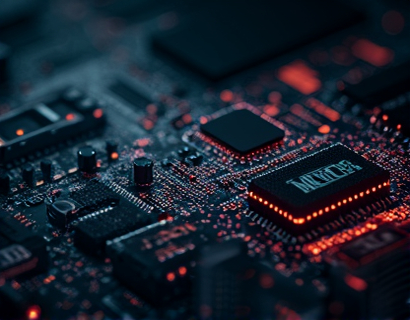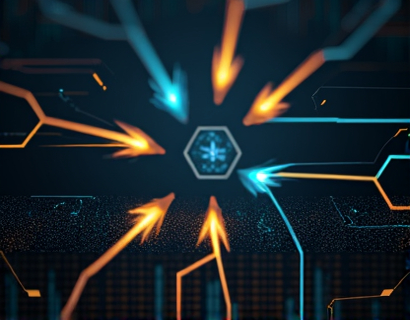Decentralized Business Transactions: Streamlining Interactions with Advanced dApp Solutions
In the rapidly evolving landscape of digital commerce, the need for secure, transparent, and efficient business transactions has become paramount. Traditional centralized systems often fall short in meeting these requirements, leading to increased reliance on decentralized applications, or dApps, which leverage blockchain technology to revolutionize the way businesses interact and conduct transactions. This article delves into the transformative power of dApps, focusing on how they streamline interactions and enhance the overall user experience in the digital age.
The concept of decentralized applications is rooted in the principles of blockchain technology, which ensures that data is distributed across a network of computers rather than being stored in a single location. This decentralization not only enhances security by eliminating single points of failure but also promotes transparency, as all transactions are recorded on a public ledger accessible to anyone. For businesses and entrepreneurs, this shift towards decentralized solutions offers a robust framework for conducting transactions that are immutable, tamper-proof, and highly secure.
One of the key advantages of dApps is their ability to facilitate seamless user connections and collaborations. Unlike traditional centralized platforms, which often require users to trust a middleman, dApps enable direct peer-to-peer interactions. This direct connection reduces friction and speeds up the transaction process, making it more efficient and user-friendly. For instance, in a decentralized marketplace, buyers and sellers can interact directly without the need for intermediaries, leading to faster transaction times and lower fees.
The architecture of a typical dApp involves several critical components. At the core is the blockchain, which serves as the decentralized database for storing transaction records. Smart contracts, self-executing contracts with the terms directly written into code, play a crucial role in automating and enforcing the rules of transactions. These smart contracts ensure that all parties adhere to the agreed-upon terms, reducing the risk of fraud and errors. Additionally, decentralized storage solutions, such as IPFS (InterPlanetary File System), enhance the scalability and reliability of dApps by storing data across multiple nodes in the network.
For tech-savvy entrepreneurs and businesses, the appeal of dApps lies in their potential to disrupt traditional business models and create new opportunities for growth. By leveraging decentralized solutions, companies can reduce dependency on centralized platforms, lower operational costs, and gain greater control over their data and processes. The transparency provided by blockchain technology also builds trust with customers, as they can verify the authenticity and integrity of transactions.
Consider a scenario where a group of independent creators wants to collaborate on a project and share resources without the need for a central authority. A dApp can facilitate this process by providing a platform where creators can securely exchange assets, such as digital art or content, using smart contracts that automatically execute the agreed terms. This not only streamlines the collaboration process but also ensures that all parties are held accountable, fostering a more trustworthy and efficient environment.
The benefits of dApps extend beyond just transaction efficiency. They also enhance data privacy and security. In a centralized system, user data is often stored in a vulnerable central database, making it a prime target for cyberattacks. In contrast, dApps distribute data across a network, making it significantly harder for malicious actors to compromise the entire system. Furthermore, users have greater control over their data, as they can choose what information to share and with whom, enhancing their privacy and autonomy.
Another significant advantage of dApps is their resilience to censorship and downtime. Centralized platforms can be shut down or manipulated by those in control, leading to service interruptions and loss of data. Decentralized applications, however, are inherently resistant to such issues due to their distributed nature. Even if some nodes in the network fail or are compromised, the overall system remains functional, ensuring continuous operation and data integrity.
The adoption of dApps is not limited to specific industries but has the potential to transform various sectors, including finance, supply chain, healthcare, and more. In finance, decentralized finance (DeFi) platforms offer alternative lending, borrowing, and trading services without traditional financial intermediaries. This democratizes access to financial services, making them available to a broader audience, including those in underserved regions.
In the supply chain industry, dApps can enhance transparency and traceability by providing a tamper-proof record of every transaction and movement of goods. This not only helps in reducing fraud and errors but also improves efficiency by enabling real-time tracking and verification. For example, a dApp can track the journey of a product from manufacturing to delivery, ensuring that all parties involved can verify the authenticity and quality of the goods at each stage.
Healthcare is another sector that can greatly benefit from dApps. Patient data can be securely stored and shared among healthcare providers, ensuring that medical records are accurate and up-to-date. This not only improves patient care but also streamlines administrative processes, reducing costs and improving overall efficiency. Moreover, patients gain greater control over their health data, deciding who can access it and for what purpose.
As the demand for decentralized solutions continues to grow, the development of advanced dApp solutions is becoming increasingly sophisticated. One such solution is the integration of zero-knowledge proofs, a cryptographic method that allows one party to prove to another that a statement is true without revealing any information beyond the truth of that statement. This technology enhances privacy by enabling transactions and verifications without exposing sensitive data, making it ideal for applications in privacy-sensitive industries like finance and healthcare.
Another advanced feature is the use of layer 2 scaling solutions, which address the issue of transaction throughput on blockchain networks. By processing transactions off the main blockchain and only recording the final results on the main chain, these solutions significantly increase the number of transactions that can be handled per second, making dApps more scalable and user-friendly.
Interoperability is another critical aspect of modern dApp development. As the ecosystem of blockchain platforms grows, the ability for different dApps and blockchains to communicate and work together seamlessly becomes essential. Protocols like Polkadot and Cosmos are leading the way in creating interoperable networks, allowing dApps to operate across multiple blockchains, thereby expanding their reach and utility.
The future of decentralized business transactions is bright, with ongoing innovations poised to address current challenges and unlock new possibilities. As more businesses and individuals recognize the benefits of dApps, the adoption rate is expected to accelerate, driving further development and refinement of these technologies. The combination of enhanced security, transparency, and efficiency makes dApps an indispensable tool for the digital economy of the future.
In conclusion, decentralized applications represent a significant leap forward in the way businesses interact and conduct transactions. By leveraging the power of blockchain and smart contracts, dApps offer a secure, transparent, and efficient alternative to traditional centralized systems. As the technology continues to evolve, it will undoubtedly play a pivotal role in shaping the next generation of digital commerce, empowering users and businesses alike to thrive in a decentralized world.










































